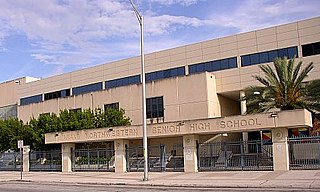Related Research Articles

The American Civil Liberties Union (ACLU) is an American nonprofit civil rights organization founded in 1920. ACLU affiliates are active in all 50 states, Washington, D.C., and Puerto Rico. The ACLU provides legal assistance in cases where it considers civil liberties at risk. Legal support from the ACLU can take the form of direct legal representation or preparation of amicus curiae briefs expressing legal arguments when another law firm is already providing representation.

Kendall is an unincorporated area and census-designated place in Miami-Dade County, Florida, United States. It is part of the Miami metropolitan area. At the 2020 census, the area had a population of 80,241.

Miami Shores or Miami Shores Village is a village in Miami-Dade County, Florida. The village is part of the Miami metropolitan area of South Florida. As of the 2020 census, the population was 11,567, up from 10,493 in 2010.

The Florida House of Representatives is the lower house of the Florida Legislature, the state legislature of the U.S. state of Florida, the Florida Senate being the upper house. Article III, Section 1 of the Constitution of Florida, adopted in 1968, defines the role of the Legislature and how it is to be constituted. The House is composed of 120 members, each elected from a single-member district with a population of approximately 180,000 residents. Legislative districts are drawn on the basis of population figures, provided by the federal decennial census. Representatives' terms begin immediately upon their election.

Dr. Michael M. Krop Senior High School is a secondary school located at 1410 County Line Road in Ives Estates, an unincorporated area of north Miami-Dade County, Florida, US. However, it serves the city of Aventura, northern fringes of North Miami Beach, and the unincorporated areas around the school such as Ives Estates/California Club and Ojus. The school is located on the Miami-Dade side of the Miami-Dade-Broward County line, and is the northernmost high school in the district. Lee Krueger currently serves as principal.

Miami Gardens is a city in north-central Miami-Dade County, Florida, United States. It is a suburb of Miami and located 16 miles (26 km) north of Downtown Miami with city boundaries that stretch from I-95 and Northeast 2nd Avenue to its east to Northwest 47th and Northwest 57th Avenues to its west, and from the Broward County line to its north to 151st Street to its south. The city's name originated from Florida State Road 860, a major roadway through the area also known as Miami Gardens Drive. It had a population of 111,640 as of 2020.

The New World School of the Arts (NWSA) is a public magnet high school and college in Downtown Miami, Florida. Its dual-enrollment programs in the visual and performing arts are organized into four strands: visual arts, dance, theatre, and music.
Miami Killian Senior High School is a secondary school located at 10655 SW 97th Ave, Miami, FL 33176 in the Kendall area of unincorporated Miami-Dade County, Florida. The school is part of the Miami-Dade County Public Schools System.

Miami Dade College (MDC) is a public college located in Miami, Florida. Established in 1959, it operates eight campuses and numerous outreach centers throughout Miami-Dade County. It is the largest institution in the Florida College System. MDC serves a significant number of minority students, particularly Hispanic students, enrolling more than any other institution in Florida.
Ronald W. Reagan/Doral Senior High School is a secondary school located at 8600 NW 107 Avenue, in Doral, Florida, United States, a Miami suburb; its principal is Ramón Garrigo. The school offers, alongside Advanced Placement courses, International General Certificate of Secondary Education (IGCSE) courses, Advanced Subsidiary (AS) courses, and A-level courses, which are international examinations valid across the world.

State Road 990 is the 2.97-mile-long (4.78 km) central section of the approximately 11.6-mile-long (18.7 km) Killian Drive, also known as Killian Parkway, Southwest 104th Street and Southwest 112th Street and historically South Kendall Drive, located in southern Miami-Dade County, Florida. Running from east to west, it serves to connect the community of The Hammocks with the village of Pinecrest via the community of Kendall, with State Road 990 connecting Southwest 107th Avenue and the Don Shula Expressway to the South Dixie Highway. Recognising the role the road played in southern Miami-Dade County's history and development, the section of State Road 990 between the Expressway and US 1 was designated the Killian Drive State Historic Highway by the Florida Senate in 1995.
Killian is a given name and surname of Irish origin.

Miami Northwestern Senior High School is a public four-year high school located in Miami, Florida, United States.

St. Brendan High School is a co-educational private Catholic high school in the Westchester census-designated place in Miami-Dade County, Florida. The school is part of the Archdiocese of Miami.
John Richard Smoak Jr. was a United States district judge of the United States District Court for the Northern District of Florida.

The Julia Tuttle Causeway sex offender colony was an encampment of banished, registered sex offenders who were living beneath the Julia Tuttle Causeway—a highway connecting Miami, Florida to Miami Beach, Florida, United States—from 2006 to April 2010. The colony was created by a lobbyist named Ron Book, who wrote ordinances in several different Miami-Dade County cities to restrict convicted sex offenders from living within 2,500 feet (760 m) of schools, parks, bus stops, or homeless shelters. Since Book was also head of the Miami Homeless Trust, he was also in charge of finding housing for the released sexual offenders. Under these ordinances, the only areas where sex offenders could legally reside within Miami-Dade County were the Miami Airport and the Florida Everglades. Miami-Dade laws are significantly stricter than State of Florida laws on residency restrictions for sex offenders. Florida state law required that no sex offender could live within 1,000 feet (300 m) from "where children gather". Under that requirement, housing was possible; however, because of Book's lobbying, the Dade County Commission increased that number to 2,500 feet (760 m), thereby banishing hundreds of local citizens who then began gathering under the Julia Tuttle Causeway.

Miami-Dade County is a county located in the southeastern part of the U.S. state of Florida. The county had a population of 2,701,767 as of the 2020 census, making it the most populous county in Florida and the seventh-most populous county in the United States. It is Florida's third largest county in terms of land area with 1,946 square miles (5,040 km2). The county seat is Miami, the core of the nation's ninth-largest and world's 65th-largest metropolitan area with a 2020 population of 6.138 million people, exceeding the population of 31 of the nation's 50 states as of 2022.

Miami-Dade County Public Schools (M-DCPS) is the public school district serving Miami-Dade County in the U.S. state of Florida. Founded in 1885, it is the largest school district in Florida, the largest in the Southeastern United States, and the third-largest in the United States with a student enrollment of 356,589 as of August 30, 2021.

The Florida Library Association (FLA) is a regional, non-profit organization that promotes professional discourse and opportunities for the library community in Florida. The FLA publishes the Florida Libraries Journal.

Miami has one of the largest and most prominent LGBTQ communities in the United States. Miami has had a gay nightlife scene as early as the 1930s. Miami has a current status as a gay mecca that attracts more than 1 million LGBT visitors a year. The Miami area as a whole has been gay-friendly for decades and is one of the few places where the LGBTQ community has its own chamber of commerce, the Miami-Dade Gay and Lesbian Chamber of Commerce (MDGLCC). As of 2005, Miami was home to an estimated 15,277 self-identifying gay and bisexual individuals. The Miami metropolitan area had an estimated 183,346 self-identifying LGBT residents.
References
- ↑ "'Killian Nine' student loses in appeals court". 2002. Retrieved 2017-11-20.
- 1 2 "'Killian Nine' student challenges strip search". 2001. Archived from the original on 2010-06-13. Retrieved 2008-01-03.
- ↑ "Florida Students Charged With Hate Crimes Over Racist Book". The New York Times. Associated Press. 1998-02-27. ISSN 0362-4331 . Retrieved 2018-02-22.
- ↑ CLARY, MIKE (1998-04-06). "Students Give, Get Lesson in 1st Amendment Protections". Los Angeles Times. ISSN 0458-3035 . Retrieved 2018-02-22.
- ↑ "Miami School Bars Return Of 9 Behind Racist Pamphlet". tribunedigital-sunsentinel. Archived from the original on February 22, 2018. Retrieved 2018-02-22.
- ↑ "9 Teens Behind Racist Pamphlet Are Free Of Hate-crime Charges". tribunedigital-chicagotribune. Retrieved 2018-02-22.
- ↑ "'Killian Nine' student loses in appeals court". STUDENT PRESS LAW CENTER. 1 May 2002. Retrieved 4 September 2023.